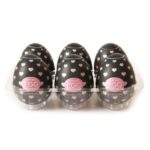
It’s the bawdiness of some of Chaucer’s Canterbury Tales that stays with you from high school lit class (literal ass-kissing? come on!). But it’s the first tale in this collection of stories told by pilgrims lodging at an inn — The Knight’s Tale – that’s quite the opposite of bawdy: a traditional romance of courtly love focused on jousts, justice, and noble ideals. It’s so romantic, in fact, two of the characters in it were the inspiration for Theseus and Hippolyta in Shakespeare’s A Midsummer’s Night’s Dream. Of course, the female love interest doesn’t have much agency — these are medieval times we’re talking about. But it’s a whole lot sweeter — and less rape-y — than a lot of the other tales. Here’s an excerpt, in which the two knights imprisoned in a tower catch a glimpse of Emelye through the bars and fall hard — which swiftly puts an end to their bromance. (Bold is original, unbolded is modern translation.)
This passeth yeer by yeer and day by day,
This passes year by year and day by day,
Till it fil ones, in a morwe of May,
Until it befell once, in a morning of May,
That Emelye, that fairer was to sene
That Emelye, who was fairer to be seen
Than is the lylie upon his stalke grene,
Than is the lily upon its green stalk,
And fressher than the May with floures newe —
And fresher than the May with new flowers —
For with the rose colour stroof hire hewe,
For her hue vied with color of the rose,
I noot which was the fyner of hem two —
I do not know which was the finer of them two —
Er it were day, as was hir wone to do,
Before it was day, as was her custom to do,
She was arisen and al redy dight,
She was arisen and all ready prepared,
For May wole have no slogardie anyght.
For May will have no laziness at night.
The sesoun priketh every gentil herte,
The season urges on every gentle heart,
And maketh it out of his slep to sterte,
And makes it out of its sleep to awake suddenly,
And seith “Arys, and do thyn observaunce.”
And says “Arise, and do thy observance.”
This maked Emelye have remembraunce
This made Emelye remember
To doon honour to May, and for to ryse.
To do honor to May, and to rise.
Yclothed was she fressh, for to devyse:
She was gaily clothed, so to say:
Hir yelow heer was broyded in a tresse
Her yellow hair was braided in a tress
Bihynde hir bak, a yerde long, I gesse.
Behind her back, a yard long, I guess.
And in the gardyn, at the sonne upriste,
And in the garden, at the rising of the sun,
She walketh up and doun, and as hire liste
She walks up and down, and as she pleases
She gadereth floures, party white and rede,
She gathers flowers, mixed white and red,
To make a subtil gerland for hire hede;
To make an intricate garland for her head;
And as an aungel hevenysshly she soong.
And she sang (as) heavenly as an angel.
The grete tour, that was so thikke and stroong,
The great tower, that was so thick and strong,
Which of the castel was the chief dongeoun
Which was the main fortification of the castle
(Ther as the knyghtes weren in prisoun
(Where the knights were in prison
Of which I tolde yow and tellen shal),
Of which I told yow and shall tell),
Was evene joynant to the gardyn wal
Was just next to the garden wall
Ther as this Emelye hadde hir pleyynge.
Where this Emelye took her pleasure.
Bright was the sonne and cleer that morwenynge,
The sun was bright and clear that morning,
And Palamoun, this woful prisoner,
And Palamon, this woeful prisoner,
As was his wone, by leve of his gayler,
As was his custom, by permission of his jailer,
Was risen and romed in a chambre an heigh,
Had risen and roamed in a chamber on high,
In which he al the noble citee seigh,
In which he saw all the noble city,
And eek the gardyn, ful of braunches grene,
And also the garden, full of green branches,
Ther as this fresshe Emelye the shene
Where this fresh Emelye the bright
Was in hire walk, and romed up and doun.
Was in her walk, and roamed up and down.
This sorweful prisoner, this Palamoun,
This sorrowful prisoner, this Palamon,
Goth in the chambre romynge to and fro
Goes in the chamber roaming to and fro
And to hymself compleynynge of his wo.
And to himself lamenting his woe.
That he was born, ful ofte he seyde, “allas!”
That he was born, full often he said, “alas!”
And so bifel, by aventure or cas,
And so it happened, by chance or accident,
That thurgh a wyndow, thikke of many a barre
That through a window, thickly set with many a bar
Of iren greet and square as any sparre,
Of iron, great and square as any beam,
He cast his eye upon Emelya,
He cast his eye upon Emelye,
And therwithal he bleynte and cride, “A!”
And with that he turned pale and cried, “A!”
As though he stongen were unto the herte.
As though he were stabbed unto the heart.
And with that cry Arcite anon up sterte
And with that cry Arcite immediately leaped up
And seyde, “Cosyn myn, what eyleth thee,
And said, “My cousin, what ails thee,
That art so pale and deedly on to see?
Who art so pale and deadly to look upon?
Why cridestow? Who hath thee doon offence?
Why didst thou cry out? Who has done thee offence?
For Goddes love, taak al in pacience
For the love of God, take all in patience
Oure prisoun, for it may noon oother be.
Our imprisonment, for it may not be otherwise.
Fortune hath yeven us this adversitee.
Fortune has given us this adversity.
Som wikke aspect or disposicioun
Some wicked aspect or disposition
Of Saturne, by som constellacioun,
Of Saturn, by some arrangement of the heavenly bodies,
Hath yeven us this, although we hadde it sworn;
Has given us this, although we had sworn it would not be;
So stood the hevene whan that we were born.
So stood the heavens when we were born.
We moste endure it; this is the short and playn.”
We must endure it; this is the short and plain.”This Palamon answerde and seyde agayn,
This Palamon answered and said in reply,
“Cosyn, for sothe, of this opinioun
“Cousin, truly, concerning this opinion
Thow hast a veyn ymaginacioun.
Thou hast a foolish conception.
This prison caused me nat for to crye,
This prison did not cause me to cry out,
But I was hurt right now thurghout myn ye
But I was hurt right now through my eye
Into myn herte, that wol my bane be.
Into my heart, so that it will be the death of me.
The fairnesse of that lady that I see
The fairness of that lady whom I see
Yond in the gardyn romen to and fro
Yonder in the garden roaming to and fro
Is cause of al my criyng and my wo.
Is cause of all my crying and my woe.
I noot wher she be womman or goddesse,
I know not whether she is woman or goddess,
But Venus is it soothly, as I gesse.”
But truly it is Venus, as I suppose.”
And therwithal on knees doun he fil,
And with that he fell down on his knees,
And seyde, “Venus, if it be thy wil
And said, “Venus, if it be thy will
Yow in this gardyn thus to transfigure
Thus to transfigure yourself in this garden
Bifore me, sorweful, wrecched creature,
Before me, sorrowful, wretched creature,
Out of this prisoun help that we may scapen.
Help that we may escape out of this prison.
And if so be my destynee be shapen
And if it be so that my destiny is shaped
By eterne word to dyen in prisoun,
By eternal decree to die in prison,
Of oure lynage have som compassioun,
Have some compassion on our (noble) lineage
That is so lowe ybroght by tirannye.”
Which is brought so low by tyranny.”
And with that word Arcite gan espye
And with that word Arcite did see
Wher as this lady romed to and fro,
Where this lady roamed to and fro,
And with that sighte hir beautee hurte hym so,
And with that sight her beauty hurt him so,
That, if that Palamon was wounded sore,
That, if Palamon was sorely wounded,
Arcite is hurt as muche as he, or moore.
Arcite is hurt as much as he, or more.
And with a sigh he seyde pitously,
And with a sigh he said piteously,
“The fresshe beautee sleeth me sodeynly
“The fresh beauty slays me suddenly
Of hire that rometh in the yonder place;
Of her who roams in the yonder place;
And but I have hir mercy and hir grace,
And unless I have her mercy and her grace,
That I may seen hire atte leeste weye,
So that I can at least see her,
I nam but deed; ther nis namoore to seye.”
I am as good as dead; there is no more to say.”
















